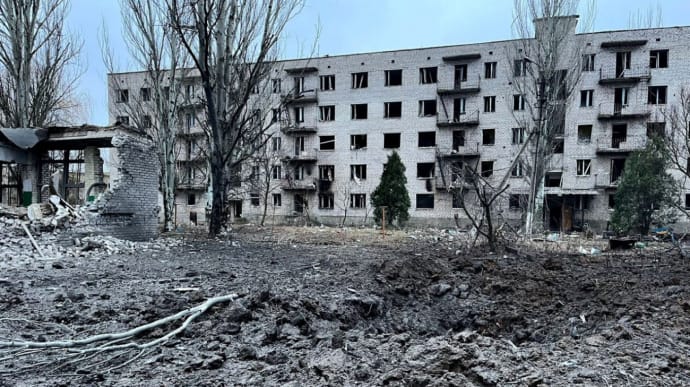Daily Flyer - March 17, 2024
A voice of Ukraine to the West

Ukraine may be forced to aim to down only 1 in 5 missiles targeting cities due to ammunition shortage
The Washington Post reported on March 15, citing unnamed Western officials, that Ukraine's air defense systems may soon deplete their munition supplies by the end of March, placing the country under severe pressure amidst ongoing Russian aggression.
Ukraine has attempted to intercept the vast majority of missiles targeting its cities, but with dwindling munitions, it may only be able to intercept a fraction of incoming threats. This alarming situation was disclosed by officials who met with Ukrainian representatives at the Munich Security Conference last month.
The depletion of munitions comes at a critical time for Ukraine, compounded by the prolonged delay of a $60 billion foreign aid bill in the U.S. Congress. Despite efforts from the White House and some members of Congress, political disputes have stalled the passage of this crucial aid package.
A senior adviser to President Volodymyr Zelensky expressed concern to the Washington Post, warning of the likelihood of significant territorial gains by Russia in the absence of new U.S. aid. The adviser highlighted the dire conditions on the front lines, including low morale and momentum among Ukrainian forces.
Russia's recent military advances, including the capture of Avdiivka in Donetsk Oblast, have underscored the urgency of the situation. Both Ukrainian and Western officials attribute these setbacks in part to the delays in U.S. aid to Ukraine.
The Institute for the Study of War (ISW) echoed these concerns, warning that Ukraine's ammunition shortage could pave the way for a Russian breakthrough on the front lines.
As Ukraine grapples with munition shortages, Russia continues its relentless targeting of Ukrainian cities, as evidenced by the deadly missile strike in Odesa on March 15. The strike resulted in numerous casualties, including fatalities and injuries among rescuers conducting operations at the scene.
The ongoing conflict has exacted a heavy toll on civilians, with over 10,500 deaths reported since 2022, including hundreds of children. However, the actual figures are believed to be much higher, underscoring the devastating impact of the war on Ukrainian society.
Kuleba calls Blinken to discuss unblocking Ukraine aid stalled in Congress
Foreign Minister Dmytro Kuleba announced on X on March 16 that he had a telephone conversation with U.S. Secretary of State Antony Blinken to discuss the urgent need to unblock aid for Ukraine, which has been held up in the U.S. Congress since autumn 2023.
The foreign aid bill, which includes approximately $60 billion for Ukraine, has faced obstacles in Congress, particularly due to objections from the Republican Party.
Although the U.S. Senate passed the $95 billion funding package, including aid for Ukraine and other allies, on Feb. 13, the bill has encountered resistance in the Republican-controlled House of Representatives.
Republican House Speaker Mike Johnson has thus far declined to bring the legislation to a vote, exploring alternative options such as passing a future aid bill with Democratic votes or splitting Ukraine and Israel aid into separate bills.
During the call, Kuleba expressed gratitude to Blinken for the latest U.S. military aid package amounting to $300 million, which includes artillery rounds and GMLRS rockets for HIMARS launchers. This package marks the first U.S. assistance since December when Ukraine received military aid worth $250 million.
Kuleba stressed the critical need for continued U.S. support, particularly emphasizing Ukraine's urgent requirement for air defense and artillery ammunition.
He emphasized the detrimental consequences of delays in aid, warning that such delays could embolden Russia and escalate the conflict, posing a threat to Europe and the democratic world.
Blinken echoed Kuleba's sentiments, emphasizing the importance of swift action by the House of Representatives to pass the supplemental security package. He reiterated the enduring support of the United States for Ukraine's sovereignty and territorial integrity in the face of Russia's aggression.
Meanwhile, as the $60 billion funding from the U.S. remains stalled, Ukraine is grappling with critical shortages of ammunition. The withdrawal of Ukrainian forces from Avdiivka and neighboring villages in February underscored the challenges faced due to weaponry shortages, as Russian troops continue to escalate attacks in Donetsk and Zaporizhzhia Oblasts.
UK defence secretary cancelled visit to Odesa due to information leak
UK Defence Secretary Grant Shapps canceled his planned trip to the city of Odesa during his visit to Ukraine on March 7 due to security concerns arising from the ongoing threat posed by Russia.
According to a report by The Sunday Times, Shapps was forced to abandon his visit to Odesa after receiving intelligence from UK sources indicating that Russian forces had become aware of his travel plans.
The decision to cancel the trip was made in response to the heightened risk posed by the presence of Russian military forces in the region, particularly given the recent missile attacks targeting civilian areas in Odesa.
The incident underscores the significant security challenges faced by officials and dignitaries visiting Ukraine amid the ongoing conflict with Russia.
Russian forces launch three missiles on Myrnohrad overnight

Russian troops carried out an attack on the town of Myrnohrad in Donetsk Oblast on the night of March 16-17, launching three missiles that resulted in injuries to an 86-year-old woman, according to the National Police of Ukraine (NPU).
The attack caused significant damage to the town, with at least eight apartment buildings, an educational institution, a utility company facility, two shops, two retail units, and three civilian cars affected.
In addition to Myrnohrad, several other populated areas were targeted by Russian forces over the past 24 hours. These included the towns of Krasnohorivka, Selydove, and Toretsk, as well as the settlements of Velyka Novosilka and Kurakhivka, and the villages of Novoselivka Persha and Novoukrainka.
Overall, 22 civilian targets were damaged in these attacks, including residential buildings, educational institutions, administrative buildings, and infrastructure facilities.
Novoselivka Persha bore the brunt of the bombardments, with four separate attacks resulting in casualties. In one incident, a person was killed, and another was injured.
In Selydove, an aerial bomb struck, injuring a woman and causing damage to multiple residential and commercial buildings.
Lastly, in Krasnohorivka, artillery shelling injured a 72-year-old man and caused damage to a private residential building.
These attacks represent a continuation of the violence and destruction inflicted by Russian forces on civilian areas in Ukraine's Donetsk Oblast.

